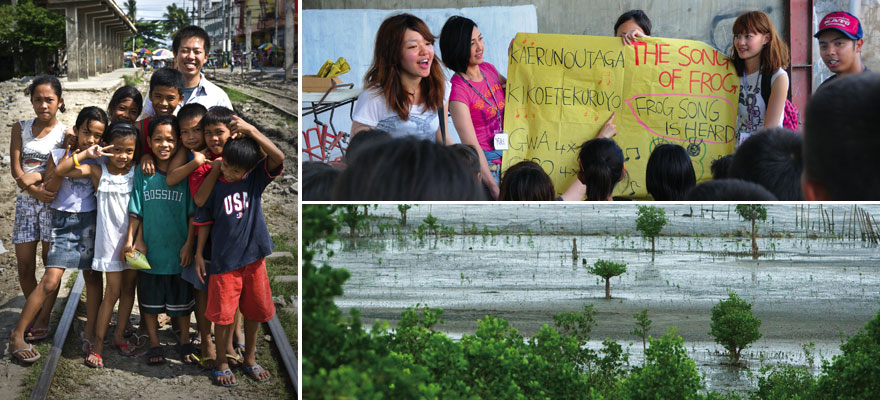Home > Highlighting JAPAN > Highlighting Japan October 2013 >Japanese Globalization
Highlighting JAPAN
Japanese Globalization
JICA'S Japan Overseas Cooperation Volunteers
Public-private volunteers abroad

THE Japan International Cooperation Agency (JICA) is a Japanese organization well known for its official development assistance (ODA) projects in developing countries. One of the main components of this program is a group of junior and senior volunteers who offer their time and expertise abroad in the cause of humanitarian assistance and civil development.
JICA volunteers live in the dispatched area, work together with the local people, speak the local language, and carry out activities with an emphasis on raising the self-reliance of their hosts, while also fostering mutual understanding. Junior volunteers are typically people aged 20 to 39 who are eager to make use of their own skills and experiences. A total of 1,744 young people are working in developing countries (as of August 2013) and are dispatched for two years. In contrast, senior overseas volunteers who are at the age of 40 to 69 are typically retirees who wish to make a further contribution to society after ending their careers. Senior overseas volunteers offer the valuable skills and experience they have acquired as professionals in their respective fields. Now, there are some 458 active senior overseas volunteers.
The attraction of becoming a junior volunteer is to obtain experiences that cannot be obtained in Japan and even youth who do not possess special sets of skill are welcome to apply. The selection process is quite demanding and requires an existing high level of linguistic and technical ability as well as that applicants be in good health. Once selected, volunteers are sent for further special training before the dispatch that emphasizes linguistics, cross-cultural communication, health and safety, and offers facts and history about their host country.
Recently, a new initiative has been receiving special attention in this field. It's called the "private sector partnership volunteer system", and it contributes to training global human resources by cooperating with companies. Each company can choose a host country and request a particular occupation, and dispatch on their own terms. It is still in its infancy compared to the individual volunteer program, but what makes the new program different is the nomination process. Companies seeking to undertake a development project abroad can dispatch employees who are interested in becoming a JICA volunteer. The employee will learn the language, culture, custom, business skills and needs through volunteer activities with the locals. They construct a deep confidence by solving local problems. Companies that hope to participate in overseas development are able to recommend an employee as a participant for the program. The employee will then be dispatched after being trained by JICA. The companies are then expected to offer specialized advice or techniques in the fields of marketing, manufacturing and servicing. Since 2012, 28 corporations have signed on to this initiative, and nine people have been dispatched abroad as a JICA volunteer.
Another such example of a private sector partnership volunteer is 28-year-old Ryo Takano. Formerly a sales executive with a life insurance company, Takano leapt at the chance to go abroad with the JICA private sector partnership program, which was placed as the company's human resource training program. In comparison to other programs, Takano was attracted to JICA's because of its tough requirements coupled with the necessity to associate at a grass roots level with the local community, and work to help them. "If I can succeed at this, I can do anything", said Takano. Now stationed some 600km from Manila in a small coastal town, and some two months into the volunteer program, Takano is currently meeting local members of the community to understand the local situation and assess problems. He hopes to provide work for the local community, many of whom are deprived, through two industrial projects and a tourism project that aims to use the unique natural heritage of the area, mangroves and jungle, to attract visitors. Although some locals speak English, Takano is experiencing a "linguistic barrier" that he hopes to overcome as many locals speak a distinct dialect of Tagalog. Takano expects participation on the volunteer program to boost his linguistic ability, as well as his ability to work in an overseas environment, and is looking forward to operating in the international field as a future career pathway.
Once volunteers return to Japan, they don't just drop out. Through their experience and expertise, returned volunteer members not only contribute to cross-cultural communication but also play a role in energizing Japan. Frequently, volunteer experienced returnees are offered jobs by local governments and companies seeking individuals who have experience in foreign problem-solving situations, helping to broaden domestic perspectives and communication. All-in-all, JICA volunteers fill an important role in representing Japan abroad and provide a caring face for international exchanges with their devoted attitude.
© 2009 Cabinet Office, Government of Japan






